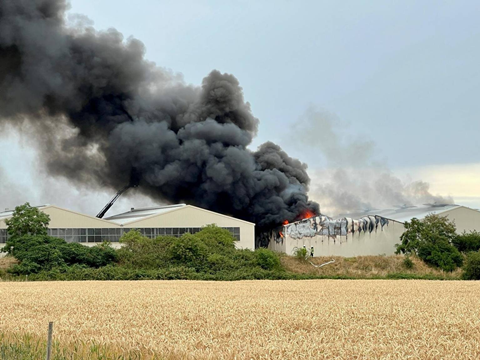
Credit: Petra Reuter
Two separate fires at Hündgen Entsorgungs’ Swisttal-Ollheim waste sorting facility have reinforced calls for a deposit system for lithium-ion batteries and legislative reform to make battery disposal safer.
The eight-hectare site features eight sorting halls that process recyclable waste from the Gelber Sack, or yellow bag, system; this includes plastic, paper, glass, and metals. According to the General-Anzeiger, Hündgen Entsorgungs processes around 200,000 tons of waste every year, of which approximately 140,000 tons are recycled.
One of the halls first set ablaze on 17th May, resulting in what the General-Anzeiger describes as one of the region’s largest firefighting operations in recent years. According to an expert, the fire was caused by a lithium-ion battery in the shredder.
As reported by Westdeutscher Rundfunk, many fires at recycling centres originate from improperly disposed batteries sustaining damage; for example, by overheating.
Christian Hündgen, managing director at Hündgen Entsorgungs, said after the initial fire that improvements to the sorting process and national laws could avoid fires caused by batteries. These could include the implementation of a deposit system for batteries and a ban on product designs that prevent batteries from being removed prior to their disposal.
Just under two months later, another fire broke out at the same facility on 6th July. This time, the fire lasted for four days, and the damage is estimated to cost at least €2 million.
Hündgen told the General-Anzeiger that this fire was “much smaller than the last one, but still annoying and unsightly” – and that, because it ignited in the delivery area outside of normal business hours, “I assume that a lithium-ion battery is responsible for the fire this time as well.”
He went on to tell Westdeutscher Rundfunk: “It’s probably another lithium-ion battery that exploded. Even a small singing greeting card can trigger a major fire.” This theory was reportedly confirmed by the company.
Westdeutscher Rundfunk lists various battery-powered products that should not be thrown away in household waste, including greeting cards that light up or play music. Among other potential hazards are electronic kitchen appliances, toothbrushes, and razors; power banks for smartphones or tablets; headphones and hearing aids; e-cigarettes and vape products; and toys and light-up shoes for children.
The publication points out that supermarkets and discount stores that sell electrical appliances are introducing drop-off points for battery-powered devices under 25 centimetres in length, although only three can be dropped off at one time. Larger devices or bulk drop-offs can be taken to recycling centres or collection points for hazardous waste.
While Oliver Krischer, North Rhine-Westphalia’s Environment Minister, has cited fires at recycling centres in his call to introduce a deposit on lithium batteries – he claims that around 100 fires occur in the region’s waste disposal facilities every year – the federal government’s draft laws to align battery legislation with European standards and revise the German Electrical and Electronic Equipment Act (ElektroG) have not included this measure so far.
“As long as the laws don’t change, such fires will continue to occur,” Hündgen said in conversation with the General-Anzeiger.
Frank Arleth, plant general manager at Hündgen Entsorgungs, added in a LinkedIn post: “The next major fire in a recycling plant, the third within a week, the second within two months in our company. If the processes are not reconsidered quickly, we don’t need to think any further about the National Circular Economy Strategy.”
“One wonders how long politicians want to continue to shrug their shoulders at our burning investments when it comes to lithium batteries,” responded Stefan Böhme, managing director at Böhme. “Action must be taken urgently: a tangible deposit on all batteries and accumulators, the fund solution for support in the event of major losses (insurability) to protect our investments.”
Members of the packaging industry have also reacted to the news. Discussing the Swisttal-Ollheim fire, Carsten Bertram, head of Packaging Sustainability at Henkel Consumer Brands, stated: “The recycling sector remains in a fragile state and needs much better support by regulations.
“Such fires, that are unfortunately happening too often at many sorting and recycling plants, are a danger for the people working in this sector and a risk to the circular economy.
“This is another urgent reminder that the system is under pressure, and that without decisive, pragmatic and fast policy action, we risk losing momentum for a better circular economy.”
Joachim Quoden, managing director at EXPRA, commented on Arleth’s post: “Interesting and frustrating how many people fight with verve and passion for a deposit system for beverage containers, but it seems that a deposit for batteries and accumulators is not an interesting topic for NGOs. Can someone explain to me why not?”
The problem of waste disposal fires is not exclusive to Hündgen Entsorgungs, or to Germany. In the past year, for example, two fires have broken out at the Fenix Battery Recycling plant in Kilwinning, Scotland; and over seventy fires were caused by discarded electronics and batteries at a waste processing plant near Grantham, England.
Last year, we heard from Ceris Turner-Bailes, chief executive of WasteAid, in the aftermath of a collapsing dumpsite in Kampala, Uganda. Following the deaths of 26 people, Turner-Bailes called for reform, explaining how increasing amounts of landfilled waste, underfunded waste management services, and the economic disparities pushing individuals into the informal waste trade contributed to the disaster.
We went on to explore the human toll of packaging waste generated in the EU, including the ‘mountains of waste’ at overseas landfill sites that threaten to collapse on waste workers and nearby residents alike.
If you liked this story, you might also enjoy:
The ultimate guide to the Packaging and Packaging Waste Regulation in 2025
How are the top brands progressing on packaging sustainability?
Everything you need to know about global packaging sustainability regulation in 2025
The key to increasing the use of reusable packaging in supermarkets














No comments yet